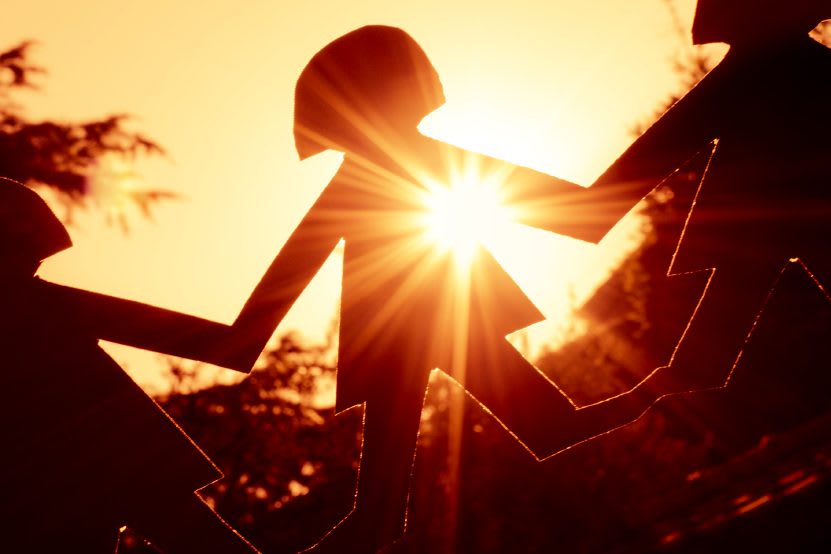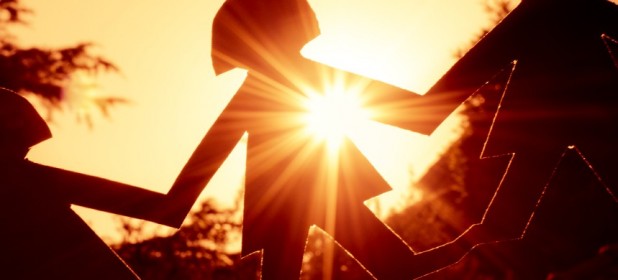A pediatrician from my area shared a remarkable story with me this week. In 2005, when Hurricane Wilma struck, many people and businesses lost power for an extended period of time, including this doctor. She was unable to practice or care for her patients.
Out of nowhere, she received a call from Dr. Aaron Kaweblum of the Boca Raton community, who offered her space to operate in his pediatric office until she was able to return to her own building.
Now, almost eight years later, her father has paid it forward. Her father is a dermatologist in Long Island. He was blessed to still have power, despite the horrific storm the area sustained. Remembering the kindness bestowed upon his daughter, he made an unsolicited call to a colleague who had lost power to see if he needed a place to host his practice until the power was turned back on.
Sometimes, the most extraordinary acts of kindness and goodness are born in the darkest moments. During those times, we get a glimpse into man’s capacity to act selflessly and to truly care about others.
Two weeks ago, a young child in my community, 13-month-old Coby, became gravely ill. He was airlifted to Miami Children’s Hospital moments before Shabbat. There was little we could do but pray, and pray we did. I will never forget the intensity, sincerity, and unity contained in the prayers that Friday evening on Coby’s behalf.
For the next week, the community came together in an incredible way. People who had never met Coby or his parents took upon themselves to do better and to be better in his merit. Tehillim (psalms) gatherings were held in the Shul, in people’s homes, and in schools across the community. A woman from the community emailed me that she was stuck in New York due to the storm, but was following Coby’s story closely. At one point during the storm, the power went out. Not sure what to do, she enlisted eight of her friends who sat the entire evening and said the complete book of tehillim for Coby.
Coby has, thank G-d, turned the corner and is expected to make a miraculous full recovery. Neither his parents nor we will ever understand why their little boy had to go through this traumatic episode.
But what we do know is that in his merit, some people opened a book of tehillim for the first time. Others, who had given up on prayer, prayed more passionately and authentically than they ever had before. Still others did the mitzvah (commandment) of taking challah (traditional Jewish bread) for the first time, or recommitted to working on lashon hara (gossip), or pledged to learn more Torah.
Sadly, for too many, it takes tragedy, crisis, or human suffering to make us stop thinking about ourselves and to think of others.
Hurricane Sandy, like so many natural disasters before her, elicits many theological questions that haunt us. Did G-d actively bring about the storm, or was it simply nature running its course? Why would G-d allow thousands, if not millions of people to suffer and to experience such devastating damage and loss?
As badly as we want answers, and as much as we may seek to understand, part of believing in G-d’s existence is the concession that there are things about His world and the way He runs it that we simply cannot comprehend. What we can grasp, however, if we pause to notice it, is the extraordinary way that His children come together in the face of disaster.
Stories abound from around the New York and New Jersey area of people and families who selflessly thought of others and sought to relieve their suffering in small but meaningful ways. One person who had power used an extension cord and two power strips and invited anyone who needed an outlet to charge their phones. Others brought supplies, shared food, offered hospitality and even provided the ability to do laundry. A Jewish community outside of New York sent buses to Long Island and New Jersey the day before Shabbat to pick up strangers and bring them back for a Shabbat with lights, heat, warm food and support.
Indeed, one leader of the Jewish community in the Five Towns described the situation as follows:
So the FEMA guys are now going door-to-door asking people what issues they have. The guy said to me, “How many people are staying here?” I said, “We had 11 on Friday night.” He said that the FEMA people are just amazed that everyone in Lawrence who got their power back have families staying with them, some they don’t even know. He said the entire team is mesmerized by how the Jewish community is taking care of their downtrodden.
Rabbi Adlerstein shared a humorous anecdote from this horrific episode.
Some community centers, shuls (synagogues), and families in areas that had power and heat invited people from Far Rockaway, Long Beach and surrounding areas to stay by them for Shabbat. They arranged transportation to pick them up. Someone who stayed behind asked a policeman if the people had been picked up yet. He told her “Yeah, the Hezbollah people came with buses and took everyone away.” She said, “Um, do you mean…the Hatzalah people?” He said, “I guess so, I’m not from this neighborhood ma’am.”
Twice in Bereishit, Avraham Avinu is confronted with the test of Lech Lecha. The first time it is to leave his homeland and his family – Lech lecha mei’artzecha. The second time it is to bring his beloved son to sacrifice him – Lech lecha el Har Ha’Moriah. The Midrash contemplates which Lech Lecha was a greater test and naturally concludes it was the latter, the commandment to Avraham to slaughter his own son.
How could the Midrash have even contemplated this question? Can one compare the test of leaving one’s homeland with the promise of achieving fame and fortune with the test of killing one’s own offspring? Of course not.
But perhaps the Midrash was wondering a different question. Perhaps it was asking, which is greater: rising to the one-time occasion to perform an extraordinary act, or persevering daily to live a life of values? This indeed, is a question worth contemplating.
From Coby’s illness and Hurricane Sandy we have learned much about ourselves and about others. We have seen the greatness, kindness, and generosity inherent within all of us. For now on, let’s work on ourselves to think of others daily and not wait for a crisis or emergency to put them first.
Support the OU Emergency Fund to Aid Institutions and Community Members and help our communities recover and rebuild. 100% of funds go directly to those in need. Donate now.
Rabbi Efrem Goldberg is the Senior Rabbi of the Boca Raton Synagogue (BRS) in Boca Raton, Florida. He serves as Co-Chair of the Orthodox Rabbinical Board’s Va’ad HaKashrus, as Director of the Rabbinical Council of America’s South Florida Regional Beis Din for Conversion, and as Posek of the Boca Raton Mikvah.
The words of this author reflect his/her own opinions and do not necessarily represent the official position of the Orthodox Union.

